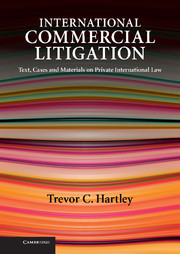Book contents
- Frontmatter
- Contents
- Table of panels
- List of figures
- Preface
- Acknowledgments
- Terminology
- Table of Latin phrases
- List of abbreviations
- Table of cases
- Table of cases (European Court of Justice, numerical order)
- Table of legislative instruments
- PART I STARTING OFF
- PART II JURISDICTION
- PART III FOREIGN JUDGMENTS
- PART IV PROCEDURE
- 19 Freezing assets
- 20 Obtaining evidence abroad: forum procedures
- 21 Obtaining evidence abroad: international co-operation
- PART V CHOICE OF LAW
- PART VI EXTRATERRITORIALITY
- Bibliography
- Index
20 - Obtaining evidence abroad: forum procedures
from PART IV - PROCEDURE
- Frontmatter
- Contents
- Table of panels
- List of figures
- Preface
- Acknowledgments
- Terminology
- Table of Latin phrases
- List of abbreviations
- Table of cases
- Table of cases (European Court of Justice, numerical order)
- Table of legislative instruments
- PART I STARTING OFF
- PART II JURISDICTION
- PART III FOREIGN JUDGMENTS
- PART IV PROCEDURE
- 19 Freezing assets
- 20 Obtaining evidence abroad: forum procedures
- 21 Obtaining evidence abroad: international co-operation
- PART V CHOICE OF LAW
- PART VI EXTRATERRITORIALITY
- Bibliography
- Index
Summary
In international litigation, you often need to obtain evidence situated in a foreign country. There are basically two ways to do this: you can rely on the powers and procedures of the court hearing the case, or you can seek the assistance of the foreign court. In this chapter, we consider the first of these; in the next chapter, we will consider the second.
Evidence from parties to the proceedings
England
Under English law, parties to legal proceedings are obliged to disclose relevant documents to the other party before the trial. This applies to documents that are, or have been, in their control. The other party must be allowed to inspect them and be given a copy if he so requests. This procedure, which is laid down in CPR 31, is known as ‘disclosure of documents’. It was previously called ‘discovery of documents’, its name in most other common-law systems.
Documents are not excluded from disclosure just because they are in a foreign country. However, a businessman with something to hide might put documents in the hands of a subsidiary or third party in the foreign country. He might choose a country under the law of which disclosure of business secrets is illegal. Whether this puts the documents beyond the reach of the English courts depends in part on the interpretation given to the word ‘control’ in the CPR, a word defined in CPR 31.8 (Panel 20.1).
- Type
- Chapter
- Information
- International Commercial LitigationText, Cases and Materials on Private International Law, pp. 449 - 476Publisher: Cambridge University PressPrint publication year: 2009



